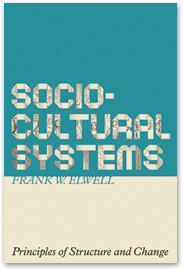
Sociocultural Systems: Principles of Structure and Change Macrosociology: Four Modern Theorists A Commentary on Malthus" 1798 Essay as Social Theory Great Classical Social Theorists In the Classical Tradition: Modern Social Theorists Dr. Elwell's Professional Page
|
rbert Spencer's Evolutionary
Sociology Robert A. Nisbet [1913-1996] | |
|
Robert Nisbet’s Leviathan
By Frank W. Elwell
Robert A. Nisbet is primarily a follower of Emile Durkheim. This
influence can be seen in his basic understanding of modern sociocultural
systems and their evolution. It is his contention that society is
increasingly dominated by large-scale administrative systems that have
severely weakened traditional groups and organizations. The
concentration and centralization of social and political power and the
consequent weakening of institutions that formerly mediated between the
individual and centralized power has had devastating effects upon
democracy, freedom, and human welfare.
Initially, Nisbet’s primary concern was parallel to Durkheim’s: the
impact that this weakening of primary group ties had on the normative
structure of society, and the consequent lack of integration of
individuals into the social order. But over the years he began to focus
more upon the impact that this shift had on representative government
and individual liberty. He argued that the present structure of the
State began
According to Nesbit, social disorganization—the decline of family,
community, and other traditional primary groups—is more properly thought
of as the wearing away of these authorities caused by the “absorption”
of their functions by the State. It is the enlargement and
centralization of State bureaucratic power that has had dramatic effect
on all other forms of social organization. The social fabric becomes
frayed. “Threads are loosened by the tightening of power at the center.”
Without common bond, individuals increasingly take advantage of one
another; relationships become commodified, increasingly relying upon
contract and cash rather than loyalty and commitment. “As the blood
rushes to the head of society,” Nisbet says, “it leaves anemic the local
and regional extremities.” This enlargement and centralization of State
power, he argues, is the root cause of the loss of authority and
function of these intermediate institutions and this has two principle
effects: 1) the weakening of local and regional checks on further
centralization; and 2) the isolation and alienation of the individual
and their consequent powerlessness. This centralization of power, a
power that is external to both local groups and the individual, makes it
difficult to establish true community. People gather together in lasting
groups and associations to accomplish things they cannot do alone,
Nisbet explains. When centralized power relieves local groups of these
functions, it undermines the foundation for community, leaving local
groups without function or authority, “what else but the social horde
and alienation can be the result?”
This centralization and enlargement of power has been pushed by an
ideology of bureaucracy, an ideology that promotes centralization,
formal hierarchy, written rules of conduct and authority, and impersonal
administration based on military models of human organization.
Government bureaucracy has come from two main sources, Nisbet argues:
mass war and the creation of the welfare state. 
Nisbet’s initial focus is upon the political State as a unified
“Leviathan.” It is his belief that the political State has rapidly
absorbed military, economic, political, and social power in the process
transforming all social organization in the West. In later writings he
details the interrelationships between State, economic, and military
power in language highly reminiscent of Mills, recognizing that State
power is often intimately involved in economic activities and has been
since the rise of capitalism itself. Beginning only with military power,
it is the State’s subsequent absorption of political, economic, kinship,
and religious functions as well as the State’s dislocation or outright
destruction of traditional authority structures that has led to the
decline of community, freedom, and democracy. The modern individual has
been freed from traditional hierarchies of class, religion, locality,
and kinship, but this freedom has brought with it insecurity,
disenchantment, anomie and alienation.
It has also subjected the individual directly to the control and
manipulation of the State. For a more extensive discussion of Nisbet's theories refer to Macro Social Theory by Frank W. Elwell. Also see Sociocultural Systems: Principles of Structure and Change to learn how his insights contribute to a more complete understanding of modern societies.
Bibliography:
Elwell, F. W. 2009. Macrosociology: The Study of Sociocultural
Systems. Lewiston: Edwin Mellen Press.
Elwell, F. W. 2006. Macrosociology: Four Modern Theorists.
Boulder: Paradigm Publishers.
Elwell, F. W. 2013. Sociocultural Systems: Principles of Structure and
Change. Alberta: Athabasca University Press.
The Present Age: Progress and Anarchy in Modern America.
New York: Harper Row, 1989.
Robert Nisbet.
1977. The Social Bond.
New York: Knopf.
Robert Nisbet.
1975. Twilight of Authority. New York: Oxford University Press.
Robert Nisbet.
1967. The Sociological Tradition. New York: Basic Books. Robert Nisbet. 1953. The Quest for Community: A Study in the Ethics of Order and Freedom. New York: Oxford University Press.
To reference Robert Nisbet's Leviathan you should use the following
format:
Elwell, Frank W. 2013. "Robert Nisbet's Leviathan," Retrieved August 31,
2013 [use actual date]
http://www.faculty.rsu.edu/~felwell/Theorists/Essays/Nisbet1.htm
|
 to gain overwhelming dominance in the West with the French
Revolution, and since that time it has taken over more and more
functions from traditional organizations and groups such as the extended
family, neighborhood, class, and regional authority. This is a disaster,
he argues, in that it is in these primary groups that the individual has
roots, is formed, and internalizes the norms, values, ideologies, and
outlook of the society.
to gain overwhelming dominance in the West with the French
Revolution, and since that time it has taken over more and more
functions from traditional organizations and groups such as the extended
family, neighborhood, class, and regional authority. This is a disaster,
he argues, in that it is in these primary groups that the individual has
roots, is formed, and internalizes the norms, values, ideologies, and
outlook of the society. 